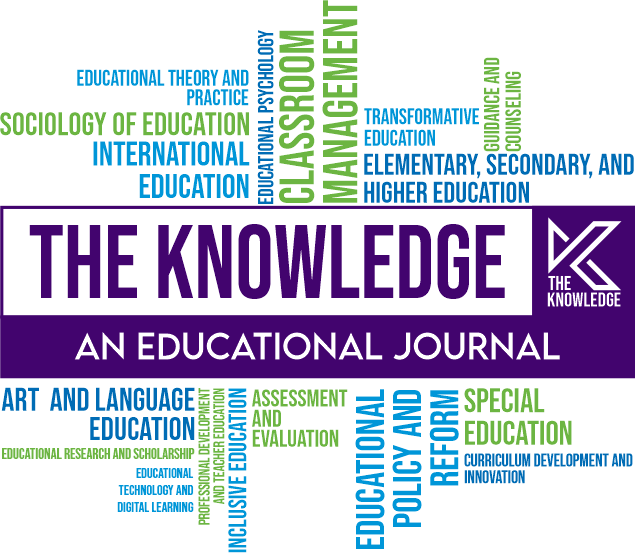Problems Faced by Students in Learning English at Elementary Level
DOI:
https://doi.org/10.55737/tk/2k24a.31069Keywords:
Problems, Learning English, Elementary Level, Education, VocabularyAbstract
This study looked into the problems that elementary students encounter while trying to learn English. This was a quantitative study, and the researchers went for a descriptive approach to gather their data through surveys. The research focused on all the elementary school students in Tehsil Kotli, AJ&K, and the researchers picked a sample of 219 students using a random sampling method. They used a five-point Likert scale questionnaire that they developed themselves to collect the responses. For crunching the numbers, they turned to SPSS (Statistical Package for the Social Sciences). The analysis included looking at frequencies, percentages, means, and standard deviations to really get the full picture. The study found that students are dealing with a bunch of challenges while learning English. Some common issues included a lack of confidence, not speaking enough English during class, wrestling with vocabulary, and just finding grammar rules really tough to grasp. To tackle these problems, the study suggests that teachers may model proper pronunciation for students, encouraging them to repeat words and phrases regularly. The study also recommends that school authorities set up language labs where students can get more practice. Furthermore, the school administration may promote online learning resources to help students out in learning English. Overall, it is about creating a supportive environment to help these students thrive in their English learning journey.
References
Ahmed, W. M. A. & Al-Ward, A. S. (2020). Motivational teaching practices from EFL learners' perspective at the tertiary level in Yemen. Indonesian Journal of Applied Linguistics, 9, 695-703. https://doi.org/10.17509/ijal.v9i3.23220
Akbari, Z. (2015). Current challenges in teaching/learning English for EFL learners: The case of junior high school and high school. Procedia, Social and Behavioral Sciences, 199, 394–401. https://doi.org/10.1016/j.sbspro.2015.07.524
Alkhawaldeh, A. (2012). High School Students' Challenges in English Reading Comprehension in Amman Second Directorate of Education. Journal of Instructional Psychology, 39(4), 217-227. https://www.questia.com/library/journal/1G1-346808462/high-school-students-challenges-in-english-reading
Alqahtani, M. (2015). The importance of vocabulary in language learning and how to be taught. International Journal of Teaching and Education, III(3), 21–34. https://doi.org/10.20472/te.2015.3.3.002
Anbreen, T. (2015). The Influence of English Second Language Learning on Pakistani University Studentsʼ Identity. Procedia-Social and Behavioral Sciences, 192, 379-387. https://doi.org/10.1016/j.sbspro.2015.06.054
Askari, A., Jawed, A., & Askari, S. (2022). Women education in Pakistan: challenges and opportunities. International Journal of Women Empowerment, 8(1), 27-32. http://dx.doi.org/10.29052/2413-4252.v8.i1.2022.27-32
Behraam, S., Hassan, M., Perveen, S. & Nadeem, M. (2015). Difficulties of teaching English at primary level in rural areas of Pakistan. International Journal of Information Research and Review, 2(4), 646–648.
Crystal, D. (1997). English as a Global Language (1st Ed.). Cambridge: Cambridge University Press.
Crystal, D. (2012). English as a Global Language (2nd ed.). Cambridge University Press.
Gan, Z. (2013). Learning to teach English language in the practicum: What challenges do non-native ESL student teachers face? Australian Journal of Teacher Education, 38(1), 42-57. https://doi.org/10.14221/ajte.2013v38n1.4
Heredia, R., & Brown, I, (2006). The Encyclopedia of Linguistics. Chicago: Fitzroy Dearbon Publishers.
Kim, S., Raza, M., & Seidman, E. (2019). Improving 21st-century teaching skills: The key to effective 21st-century learners. Research in Comparative and International Education, 14(1), 99-117. https://doi.org/10.1177/1745499919829214
Mohammed, M. H. (2018). Challenges of learning English as a foreign language (EFL) by non-native learners. International Journal of Social Science and Economic Research, 3(4), 1381-1400.
Rao, P. S. (2019). The role of English as a global language. Research Journal of English (RJOE), 4(1),65–79.
Richards, J. C. (1976). The Role of Vocabulary Teaching. TESOL Quarterly, 10(1), 77– 89. https://doi.org/10.2307/3585941
Sari, I. F. (2023). Linguistics Learning Style as Innovation: The Successful of English Foreign Language Students. ELTALL: English Language Teaching, Applied Linguistic and Literature, 4(2), 18-32. https://doi.org/10.21154/eltall.v4i02.7443
Schmitt, N. (2000). Vocabulary in language teaching. New York: Cambridge University Press.
Downloads
Published
Issue
Section
License
Copyright (c) 2025 Copyright in the THE KNOWLEDGE is retained by the author(s). Authors also grant any third party the right to use the article freely as long as its integrity is maintained and its original authors, citation details and publisher are identified.
This work is licensed under a Creative Commons Attribution-NonCommercial 4.0 International License.







